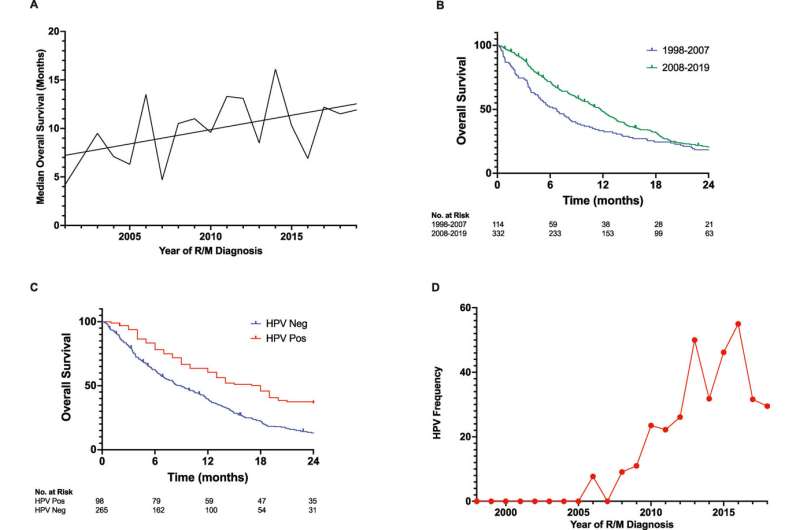This article has been reviewed according to Science X's editorial process and policies. Editors have highlighted the following attributes while ensuring the content's credibility:
fact-checked
peer-reviewed publication
trusted source
proofread
Early findings suggest clinical and lab-based approach critical to tracking head and neck cancer recurrence

Early findings of two studies from the University of Michigan Rogel Cancer Center shed light on new ways to anticipate recurrence in HPV-positive head and neck cancer sooner. The papers, published in Cancer and Oral Oncology, offer clinical and technological perspectives on how to measure if recurrence is happening earlier than current blood tests allow, and provide a framework for a new, more sensitive blood test that could help in this monitoring.
"When metastatic head and neck cancer returns, it impacts their quality of life and can be disfiguring, interfering with the ability to talk, swallow, and even breathe," said Paul Swiecicki, M.D., associate medical director for the Oncology Clinical Trials Support Unit at Rogel. "As of now, there's no test to monitor for its recurrence except watching for symptoms or potentially using a blood test which may not detect cancer until shortly before it clinically recurs."
The paper in Cancer aims to identify different clinical ways that providers can more strategically track for recurrence. To do this, Swiecicki and his team needed to first understand what patient population was at the highest risk to then figure out an appropriate monitoring pattern.
The team examined 450 patients with metastatic head and neck cancer, including people with HPV-positive and HPV-negative cancer. HPV-positive cancer is caused by the human papillomavirus and is increasingly more common in head and neck cancer patients. The team identified some predictors of when recurrences would happen, and to what organs the recurrent cancer would most commonly spread.
Patients with HPV-positive cancers were found to develop recurrent disease significantly later than those that were HPV-negative, and also were more likely to spread to the lungs. Taken together, these characteristics may help create a "surveillance" method in the future that combines routine blood testing and imaging to hopefully catch these recurrences and intervene before it's incurable.
Swiecicki is quick to mention that, at this point, the results of this study are largely theoretical and provide a helpful framework to direct further research. That's where the newly developed blood test, highlighted in Oral Oncology, comes into play.
Blood biomarkers—pieces of DNA that tumors shed into the blood—are tiny and hard to detect. Commercially available blood tests currently being used may not be sensitive enough to detect a recurrence significantly earlier than clinical surveillance, though several studies with multiple types of tests are ongoing.
A research team, led by Muneesh Tewari, M.D., Ph.D., Swiecicki and Chad Brenner, Ph.D., aimed to create a highly sensitive blood test to detect cancer even when a smaller number of DNA fragments were present, with the intention of providing a better option for detecting cancer earlier in patients.
Not only is this test more sensitive and able to detect a smaller number of DNA fragments in blood, but it's innovative in other ways too, says Chandan Bhambhani, Ph.D., the first author of the study. "We achieved this level of sensitivity by looking for nine different pieces of the HPV genome DNA all at once," said Bhambhani, research lab specialist.
Tewari says this is a step towards a more proactive approach to tackling recurrence in head and neck cancer. "As of now, we only have the tools to react to symptoms when they recur. We want to find a way to be able to detect what's causing the symptoms much, much sooner, even before the symptoms appear."
As a clinician, Swiecicki agrees. "It's exciting to have the ability to potentially detect cancer before it's incurable and offer us a window for clinical trials to see if we could intervene on cancer to help give people both a better quality of life and perhaps longer quality of life, and even convert their disease from incurable to curable. We don't know if that's the case yet, but this is the first tool needed for that to develop."
"Successful collaborative research projects like these are the direct result of how the Rogel Cancer Center enables our faculty to work together in ways that might not otherwise be possible. We have an outstanding network of faculty and researchers at our university, who are working together to develop innovative blood-based tests like the one highlighted in this story. It is our hope that these collaborative projects will lead directly to even more tools that improve the outcomes and quality of life of cancer patients," said Brenner, Director of the Head and Neck Oncology Program.
More information: Catherine T. Haring et al, Patterns of recurrence in head and neck squamous cell carcinoma to inform personalized surveillance protocols, Cancer (2023). DOI: 10.1002/cncr.34823
Chandan Bhambhani et al, Development of a high-performance multi-probe droplet digital PCR assay for high-sensitivity detection of human papillomavirus circulating tumor DNA from plasma, Oral Oncology (2023). DOI: 10.1016/j.oraloncology.2023.106436
















